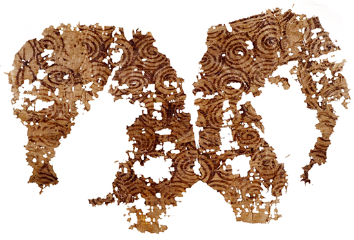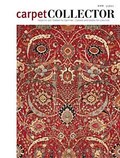Links
Forschungsinitiative 'Spiraltextile': internationale Kooperation Julia Galliker, Universität Michigan, Ann Arbor, mit Ines Bogensperger, Akademie der Wissenschaften, Wien und TKF:
Beate und Celina von Harten mit zwei großartigen Filmen auf ihrer Homepage:
Hier zu sehen "Wenn Fäden in den Himmel ziehen" — eine Tapisserie:
Tim Steinert
www.carpet-xl.com | www.carpetcollector.com
http://www.muschelseide.ch/de.html
Hier finden sich alle Informationen zum Thema Muschelseide und ihrer Lieferantin der Pinna nobilis L., der Edlen Steckmuschel.
Die Hallstatt-Forschung der Prähistorischen Abteilung des Naturhistorischen Museums in Wien informiert auf ca. 100 Seiten über die Wirtschafts- und Kulturgeschichte von Hallstatt, immerhin 7000 Jahre. Infos über die vier Forschungsschwerpunkte (Gräberfeld, Bergwerk, Wirtschaftsraum und Textilforschung) können hier ebenso nachgelesen werden:
Bücher der Sammlung Katoen Natie (Antwerpen) können über folgende Seite online bestellt werden:
In April this year I started a 5-year European Research Council Starting Grant funded project "Production and Consumption: Textile Economy and Urbanisation in Mediterranean Europe 1000 to 500BC". The website, although still quite rudimentary, is finally live and I invite you to visit it occasionally to find out about our progress in the next 5 years:
PROduction and CONsumption

Textile Economy and Urbanisation in Mediterranean Europe
1000 to 500 BCE
The PROCON project aims to explore the role of textile production and consumption in the formation of early states, using the example of the Mediterranean Europe during 1000 to 500 BCE. In this
project we are seeking answers to the following questions:
- How was textile production and consumption organised: where did the various resources come from, what were the technologies used, what was the level of organisation?
- Who was involved in textile production and consumption?
- What was the quality and quantity of textiles produced and how they changed over time in response of urban consumer demands?
The focus is on the significance of the production and consumption of textiles for the development of city-states (as clothing, elite regalia, trade and exchange items) and the implications of this for other aspects of the economy, such as the use of farm land, labour resources and the development of urban lifestyle. The geographical area selected for this study is eastern, central and western Mediterranean Europe, Greece, Italy and Spain.







